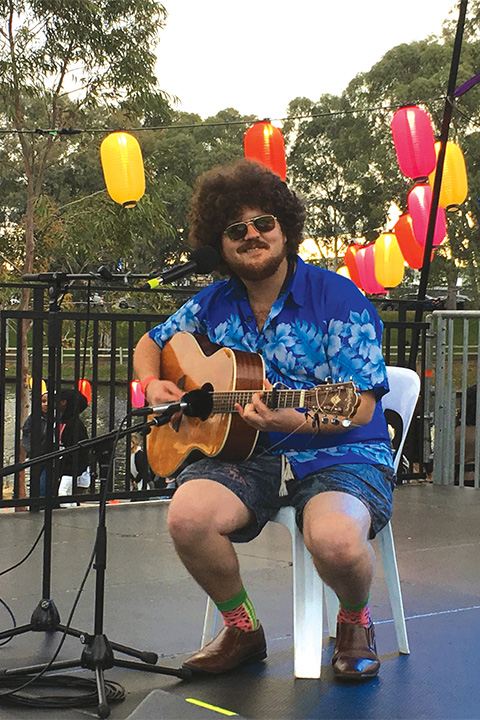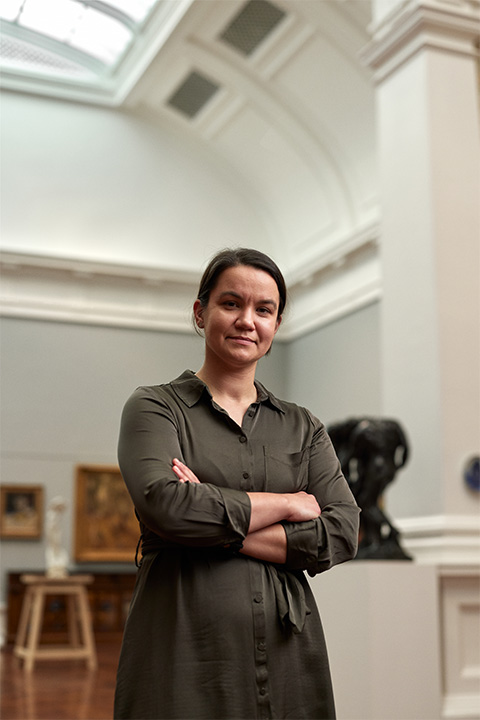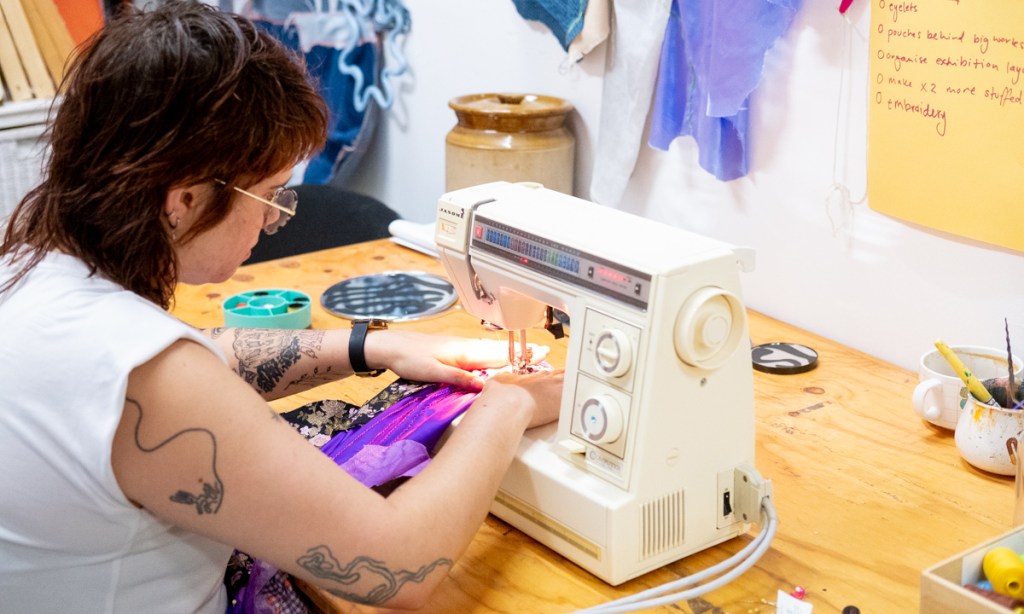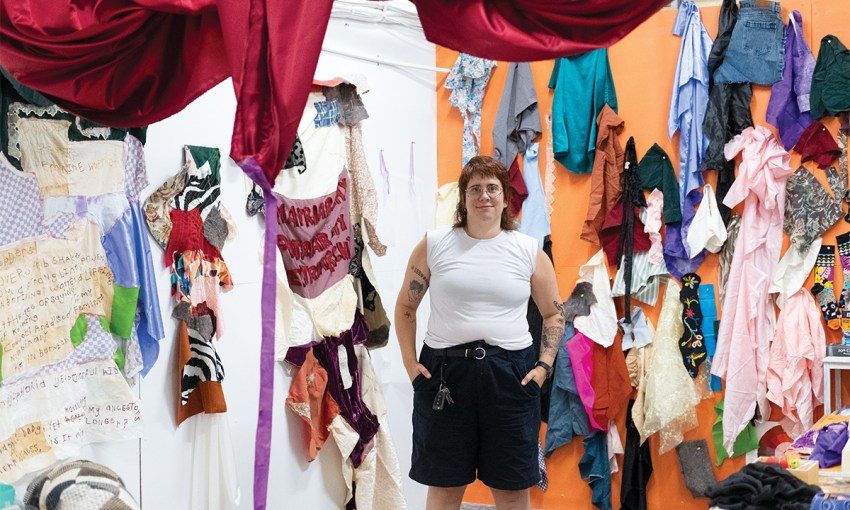A career in the global arts industry was their dream, and these three professionals made the conscious decision to achieve this aspiration while living a life filled with purpose here in Adelaide.
The pursuit of happiness
New Yorker Justyna Jochym first visited Adelaide in 2017 on a junket with the Krakow Festival Office. By day three of her visit – during an organised trip to Willunga – she decided to move here.
“I just thought, ‘How does such a place exist? Essentially within like 20 to 40 minutes of everything,’” Justyna, who is now CEO of Festival City Adelaide, the industry body promoting South Australia as the Festival Capital of Australia.
This article first appeared in CityMag’s 2023 Festival Edition, on streets now.
Find a copy
From a collaboration between Krakow and Adelaide, sparked when the cities were both recognised as international hubs for arts and culture, Justyna is now a full convert to all that is offered by living and working in Adelaide.
Justyna grew up in New York – the quintessential breeding ground for creatives – but it wasn’t until she moved to Krakow in her 20s that she went to her first festival.
“In Adelaide, people start going to the Fringe, to WOMADelaide, to SALA to DreamBIG, to all these different festivals at such a young age,” she says.
“They’re just part of our daily fabric, whereas, really, these are globally significant assets and I don’t think we’ve necessarily come to see them in that light yet.”
But for prolific multidisciplinary artist Kyron Weetra, who is of Narungga and Saxon descent, the city’s creative legacy is ever-present.
“Adelaide has always been a place where people gather and make art, even pre-colonially. And through that, we have such a rich modern music history,” Kyron says. “We have a strong history of multicultural art here in Adelaide, and that’s something that once you’re aware of, you can kind of see it everywhere.
“It’s a beautiful thing to be a part of.”
Although music-making is his current focus, Kyron has been making his way through the literary and theatre industries for around a decade. In 2017, he helped found independent production company Cackling Jackal.

Kyron Weetra
Kyron recognises the lasting impacts of cultural institutions like the South Australian Film Corporation – the longest-running on the continent, established under Dunstan’s premiership 50 years ago – along with the State Theatre Company and Carclew.
“I think we kind of forget how lucky we are having all of these opportunities,” Kyron says. “It’s very easy to be lured by the glitzy golden grass of the East Coast but I think there’s a lot to be said for Adelaide as a place to create.”
Kyron has played around 100 gigs in the last year – almost two a week – alternating between the funk quintet Thoma and the Humbugs and new-wave six-piece Street Legal.
He believes live music can be a way of noticing the beauty in what’s around.
“Playing among people in Adelaide – in the afternoon at the shops, in the evening at a club, in the morning at the beach – is just so rewarding,” he says. “That’s kind of the essence of music, is that tactile feedback.”
For Justyna, Adelaide’s live music – and festival – scene forged a poignant long-distance connection between her and her family during the pandemic.
When her father’s favourite band the Tesky Brothers played at the scaled-down version of WOMADelaide in 2021, her parents in New York were going through a hard time.
Justyna says she held her phone still for the whole set so her father could take it all in.
“I spun him around at the end of the concert, and you could just see,” she says, gesturing to tears falling. “Only in Adelaide could I have been able to give my dad that gift.
“That’s an example of community – the fact that audiences even showed up during a pandemic and followed all the rules.”

Justyna Jochym
This care for each other is what keeps young non-binary Kaurna, Narungga and Ngarrindjeri visual artist, curator and poet Tikari Rigney here.
“I just love how small the community is, and how warm,” Tikari says. “I think it’s because everyone is so interconnected.
“There’s a lot of kindness and generosity and openness to explore.”
Tikari says this allows artists to take more risks.
Tikari’s Solidarity Collective – a group of artists with diverse experiences who meet up to celebrate and learn from each other – is a way of fostering this purposeful giving.
“Artists that are doing really great things aren’t being given these opportunities because they haven’t built up trust with these institutions that have historically shut them out,” they say.
“If we make these kinds of spaces and say, ‘Hey you’re welcome’, then people are more likely to make that leap of faith.”

Tikari at work on her art
Justyna says it is this generosity of spirit that struck a chord, when she first moved over.
“People just kept offering and opening their homes to me. Some of them would offer help to move things – and I didn’t know these people,” she says.
“The quality of festivals is really connected to the quality of community that they garner, and that’s what I think makes us a really great festival city and festival state.”
Kyron agrees, saying the things he loves about creative hubs across the world – like Edinburgh – remind him of Adelaide.
“There’s these sort of base building blocks that Adelaide has, that a lot of great cities have – a really strong and community-minded student population,” he says.
Justyna says while this sense of community is a defining factor, South Australia is still in the exciting phase of shaping its identity for an international audience.
“I think the major barrier is our own internal levels of gumption,” she says.
To Justyna, the high quality of South Australian offerings means people have a different idea of what is standard.
She recalls spending more than eight hours travelling and paying multiple road tolls to go for a hike during a recent visit back to the United States.
“The fact that within 30, 40, 60 minutes you’re knocking on some really cool natural phenomenon here in South Australia is a privilege, and to perceive it as something that is standard is even more so a privilege,” she says.
South Australia’s ecological offerings aren’t lost on Kyron.
“We just have all of the world in our state almost,” he says.
But, for Kyron, there are also more pragmatic considerations than the region’s terrain.
“It’s very easy for young artists to have the grass-is-greener mentality, because it’s so much busier and more affluent on the east coast, but you fall into the same trappings that you do anywhere else, and it’s even more hectic over there, if only for the cost of living,” he says.
Practicalities aside, Kyron and Tikari – like Justyna – feel a deeper pull to live and create in the region.
Kyron remembers the first time he went out to Narungga country.
“I stood over and looked over the ocean and thought, ‘This is home, this is where I need to be’,” he says. “There is a real sense of place and spirit here that I want to engage with and inhabit.”
For Tikari, their grandmother’s wisdom and experiences are a guiding force.
“A big, important part of my art practice is bringing community with me, whether that’s family in my literal community, or whether that’s creating a community,” they say.
“We are the next generation of the Adelaide art community so we will have to actively work towards what we want.”




